Rafale fighter jet and India
This is a collection of articles archived for the excellence of their content. |
Contents |
History
Sequence of events
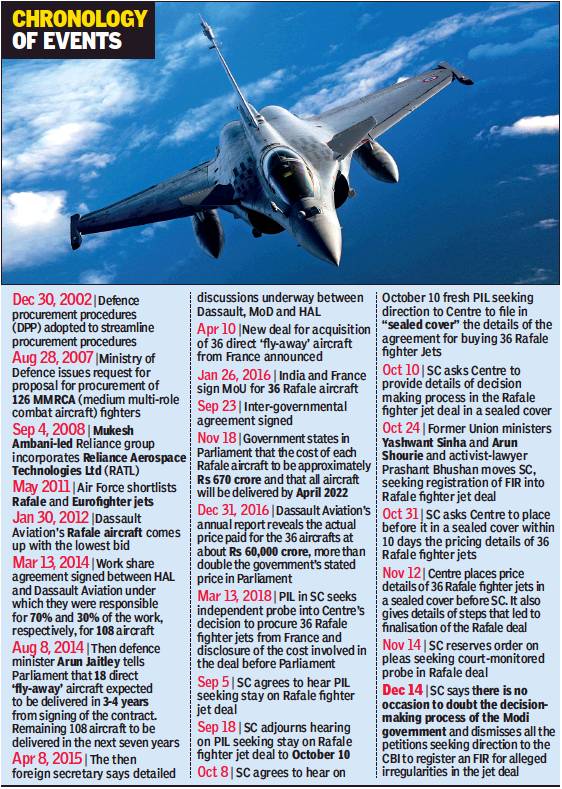
From: December 15, 2018: The Times of India
See graphic:
Rafale fighter jet and India- Chronology of events
Pact for 126 jets was replaced by one for 36
How pact for 36 fighters replaced one for 126 jets, December 15, 2018: The Times of India
The Supreme Court narrated how the UPA’s deal for 126 Rafale jets, of which 18 were to come in flyaway condition and Hindustan Aeronautics Ltd (HAL) was to manufacture the rest under licence, got replaced in 2016 by the NDA government, which went for 36 fully-loaded jets with Reliance Aerostructure Ltd as Indian offset partner.
The Defence Acquisition Council (DAC) on June 29, 2007, granted acceptance of necessity for procurement of 126 medium multirole combat aircraft (MMRCA), including 18 flyaway aircraft (equivalent to single squadron) to be procured from original equipment manufacturer with remaining 108 jets to be manufactured by HAL under licence, to be delivered over a period of 11 years from the date of signing the contract.
Six vendors submitted proposals in April 2008 and and these were subjected to technical and field evaluation. Commercial bids were opened in November 2011 and Dassault Aviation was declared the lowest bidder in January 2012. “Negotiations commenced thereafter and continued but without any final result. In the meantime, there was a change of political dispensation at the Centre sometime in the middle of 2014,” the SC said.
The Centre told the SC that HAL would require 2.7 times higher man-hours compared to the French side for the manufacture of Rafale aircraft and that issues over Dassault undertaking contractual obligations for 108 aircraft to be manufactured by HAL remained unresolved for three years.
“Such delay is said to have impacted the cost of acquisition, as the offer was with ‘in-built escalation’ and was influenced by eurorupee exchange rate variations. The stalemate resulted in the process of RFP (request for procurement) withdrawal being initiated in March 2015,” the SC said.
On April 10, 2015, an Indo-French joint statement for acquisition of 36 Rafale jets in flyaway condition through an inter-governmental agreement was issued and the same was approved by the DAC. The RFP for 126 Rafale jets was finally withdrawn in June 2015.
Negotiations were carried out and the process was completed after inter-ministerial consultations with the approval of the Cabinet Committee on Security. The contract, along with aircraft package supply protocol, weapons package supply protocol, technical agreements and offset contracts was signed with respect to 36 Rafale jets on September 23, 2016. These aircraft were scheduled to be delivered in a phased manner from Oct 2019.
Price in 2011, 2016
Move to buy only 36 Rafales raised price by 14%: Report, January 19, 2019: The Times of India
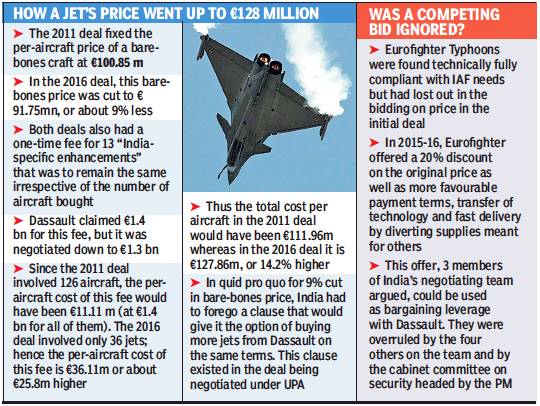
From: Move to buy only 36 Rafales raised price by 14%: Report, January 19, 2019: The Times of India
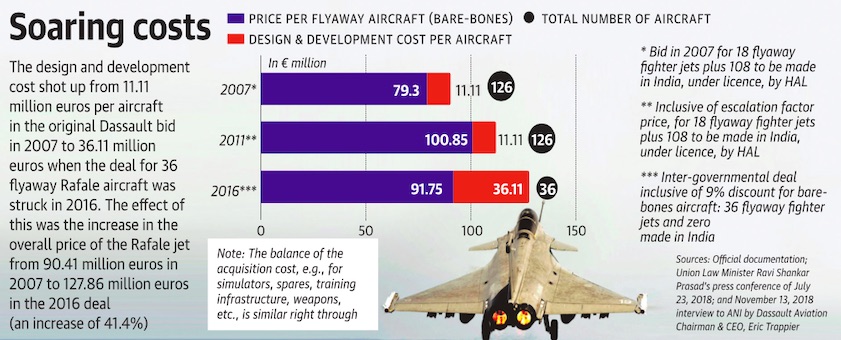
Price per flyaway aircraft;
Design and development cost per aircraft;
Total number of aircraft- 2007- 16
From: N. Ram, PM Modi’s decision to buy 36 Rafales shot the price of each jet up by 41%, January 18, 2019: The Hindu
Order Scaled Down From 126, Fixed €1.3Bn Fee For India-Specific Fitments Led To Higher Cost Per Aircraft, Says Newspaper
The decision to scale down the deal for Rafale fighter jets from France to 36 aircraft instead of the originally proposed 126 effectively pushed up the total cost of the acquisition per craft, making it about 14% more costly, a report in The Hindu said.
The report by N Ram — a former editor-in-chief of the paper, and now chairman of the company that owns The Hindu — pointed out that Dassault was charging a one-time ‘design and development’ fee of 1.4 billion euros for 13 “India-specific enhancements” to the jet in the original deal. This was negotiated down to 1.3 billion in the new deal. However, since the fee was to be spread over a much smaller number of planes, that still meant the per-fighter cost of this fee went up from 11.11 million euros to 36.11 million euros. As a result, the total cost per plane was 14.2% higher in the deal signed by NDA than in the one under discussion under UPA.
Citing official documents, the report noted that three members of the seven-member Indian negotiating team under the Modi government had objected to the fee being charged for the India specific enhancements as “too high”. They were the joint secretary & acquisition manager (air) Rajeev Verma, financial manager (air) Ajit Sule and adviser (cost) MP Singh. However, they were overruled by the remaining four members of the team headed by the deputy chief of air staff of the IAF. The team resolved by a 4-3 majority that since the fee had been brought down from 1.4 billion euros to 1.3 billion euros and was a onetime cost, it should be accepted. It placed these facts before the Defence Acquisition Council (DAC) headed by the defence minister, which agreed with the majority view and this was later ratified by the Cabinet Committee on Security (CCS).
The Hindu reported that various aspects of the deal were referred back to the DAC on five separate occasions and that each of the 10 contentious issues within the negotiating team was settled by a 4-3 split within the team.
Citing the government’s notes on the decision-making process in the Rafale deal that were submitted to Supreme Court, Ram noted that while DAC was authorised to take a decision, it had chosen to “pass the buck” on to the CCS headed by the PM, which quickly ratified the majority decisions.
The report also said that the three dissenting members of the negotiating team had suggested using a fresh offer for Eurofighter Typhoons (Rafale’s competitor) as bargaining leverage in the negotiations, but the majority overruled this on the grounds that this offer was “unsolicited”, against the provisions of the defence procurement procedure and a violation of CVC guidelines since it was given after the bidding closed.
Eurofighter had offered a 20% discount on its earlier price as well as improved aircraft capabilities, “favourable payment terms”, setting up a production line and a Eurofighter Typhoon Industrial Park in India and “a comprehensive training and support programme”. Further, it proposed faster delivery of Eurofighter jets by diverting deliveries meant for Germany, the UK, Italy, and Spain.
The Eurofighter had been found technically fully compliant with the IAF’s requirement and had lost out on the deal in 2011 only because of the price factor. He raised doubts about whether the offer was truly unsolicited and argued that the NDA deal was in fact a new deal and hence the Eurofighter offer could well have been used as a leverage.
The Hindu reported that the quid pro quo for a 9% lower price of the bare-bones jet was that there would be no “followon” clause. This, the report said, is standard practice in defence contracts and allows the buyer the option of a later contract for up to 50% of the original quantity under the same terms.
In the UPA deal, there was thus the option to buy 189 (126 plus 63) jets with the same fixed cost of design and development for the India- specific upgrades. This clause was dropped in the 2016 deal.
Rafale twin-engine multi-role fighter jet
The first squadron
Rajat Pandit, Dragon's lair on Rafale flight path, Jan 7, 2017: The Times of India
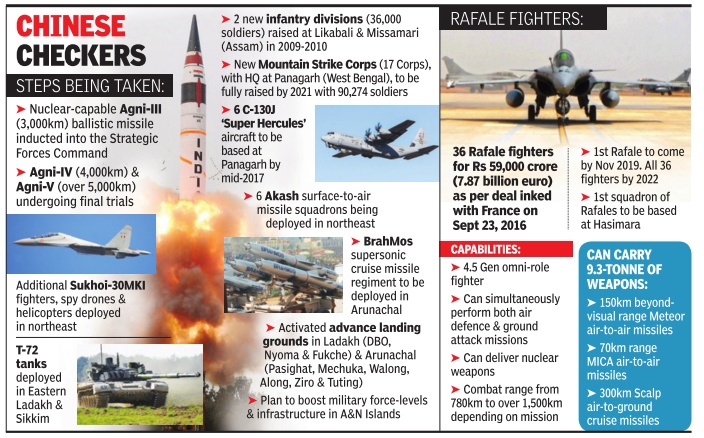
First Squadron Will Be Based In Bengal To Boost Firepower In Eastern Sector
India will base its first squadron of Rafale fighter jets, which are also capable of delivering nuclear weapons, in the eastern sector as part of the overall policy to gradually build nuclear as well as conventional deterrence against China.
With Sukhoi-30MKI fighters already operating from Tezpur and Chabua in Assam, the IAF has now finalised plans for the first 18 Rafales to be stationed at the Hasimara airbase in Bengal from late-2019.This comes at a time when India is also conducting final trials of the nuclear-capable Agni-IV and Agni-V ballistic missiles after the Strategic Forces Command inducted the AgniIII a couple of years ago.
Under the Rs 59,000 crore (7.87 billion euro) deal inked with France in September last year, the IAF will get 36 Rafales in batches by mid-2022 or so. With 14 India-specific requirements, including the capability for “cold start“ from high-altitude regions, the Rafale packs quite a punch with its ability to carry 9.3-tonne of weapons and simultaneously perform both air defence and ground attack missions.
“The Hasimara airbase currently has MiG-27s that will be retired over the next two-three years. They will be replaced by Rafales. A team from Dassault Aviation has already visited Hasimara to review the maintenance and other infrastructure required there,“ said an official.
“The Sarsawa base (UP), among other places, is being considered for the second Ra fale squadron. Under the contract, Dassault has to ensure minimum 75% availability for the jets at all times under the performance-based logistics support for the first seven years, which can be extended by another five,“ he added.
The IAF also activated the advance landing ground (ALG) at Tuting, in Arunachal's Upper Siang district, just 10 days ago. It is the sixth such ALG to be made operational in Arunachal apart from the ones in eastern Ladakh, all with an eye firmly on China.
Moreover, the Panagarh base in Bengal is also set to get its six C-130J Super Her cules aircraft. Panagarh, of course, is also going to be the headquarter of the Army's new 17 Mountain Strike Corps being raised with two high-altitude infantry divisions, apart from other armoured, artillery , air defence and engineer brigades spread from Ladakh to Arunachal.
UPA precedents (vis-à-vis Rafale)
NDA’s Rafale deal 9% cheaper than UPA’s, asserts Prasad, July 24, 2018: The Times of India
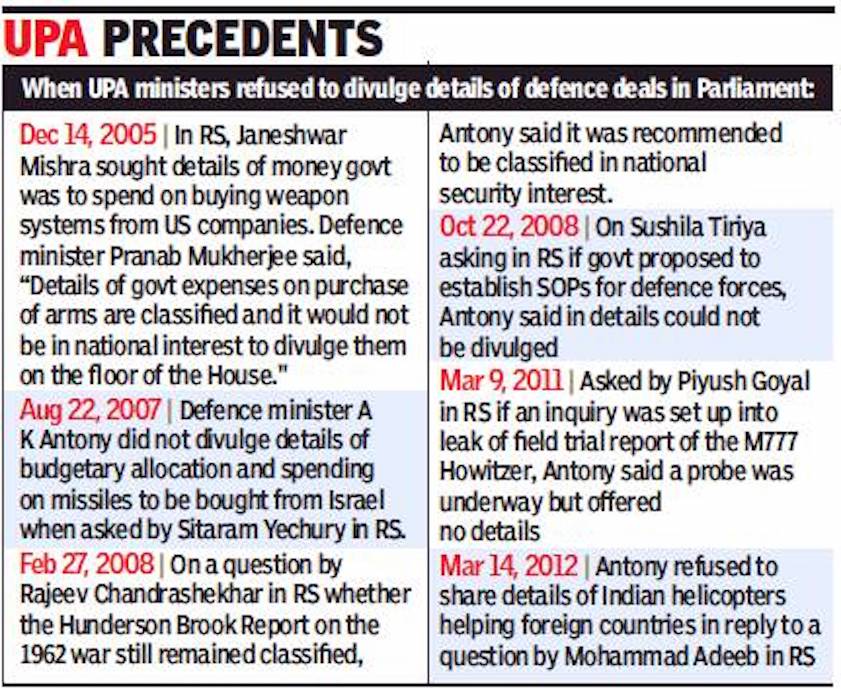
From: NDA’s Rafale deal 9% cheaper than UPA’s, asserts Prasad, July 24, 2018: The Times of India
BJP said the Rafale price negotiated by the Modi government for each French fighter jet was 9% less than what was negotiated by UPA.
With Congress persisting with its charge of bribery and the claim that the government wrongly invoked the “secrecy” clause to keep a lid on details of the deal, BJP fielded law minister Ravi Shankar Prasad to issue a rebuttal. “UPA invited quotes for 126 aircraft in 2007. The price quoted for each was 79.3 million euros which also had in-built escalation formula. When the bid was opened in 2011, the proposed cost in the bid document was 100.85 million euros per aircraft. However, this could not be finalised. After NDA came to power, under the inter-government agreement in 2016, the cost per aircraft finalised was 91.75 million euros. Therefore, the price determined during NDA government is 9% lower than what was negotiated during UPA. The corresponding cost in Rs 670.32 crore per aircraft has been conveyed to Parliament,” he said.
Prasad said the allegation of corruption was “manufactured” to establish an equivalence between the UPA and the Modi government on the issue of corruption, and insisted that specific details of the deal could not be disclosed not just because doing so would violate the secrecy clause signed with the French, first under the UPA, but also because it would be detrimental to national security.
“The cost gives an indication of the additional weaponry and capacity to the aircraft. This was UPA’s own stand on several occasions. To ask for disclosure of the same implicitly means that the enemy has to be informed of the capacity and weaponry of our combat aircraft.”
The allegations and the defence
Decoding Rafale deal: From allegations to counter-allegations, August 29, 2018: The Times of India
As the controversy surrounding Rafale deal escalates, here is an explainer and a timeline relating to India's purchase of 36 combat jets from France for an estimated Rs 58,000 crore:
What is Rafale?
Rafale is a French twin-engine multi-role fighter jet designed and built by Dassault Aviation. The Rafale jets are considered one of the most potent combat jets globally.
What was the UPA deal?
India began the process to buy a fleet of 126 Medium Multi-Role Combat Aircraft (MMRCA) in 2007 after the defence ministry, headed then by Congress leader A K Antony, cleared the proposal from the Indian Air Force.
The contenders for the mega deal were Lockheed Martin's F-16s, Eurofighter Typhoon, Russia's MiG-35, Sweden's Gripen, Boeing's F/A-18s and Dassault Aviation's Rafale.
After a long-drawn process, bids were opened in December 2012 and Dassault Aviation emerged as L-1 (lowest bidder). In the original proposal, 18 planes were to be manufactured in France and 108 in India in collaboration with the Hindustan Aeronautics Ltd.
There were lengthy negotiations between the then UPA government and Dassault on prices and transfer of technology. The final negotiations continued till early 2014 but the deal could not go through.
Details of the negotiated price per Rafale were not officially announced, but it was suggested by the then UPA government that the size of the deal would be $10.2 billion. The Congress claimed per aircraft rate including avionics and weapons was zeroed in at Rs 526 crore (As per Euro exchange rates prevailing then).
What was the deal finalised by Modi government?
During his visit to France, Prime Minister Narendra Modi on April 10, 2015, announced India will purchase 36 Rafale jets in a government-to-government agreement. After the announcement, questions were raised by the Opposition on how the PM finalised the deal without approval of the Cabinet Committee on Security.
A joint statement issued on April 10, 2015, after talks between Modi and then French President François Hollande, said they agreed to conclude an Inter-Governmental Agreement for supply of 36 Rafale jets on terms that would be better than conveyed by Dassault Aviation as part of a separate process underway.
The statement said the "aircraft and associated systems and weapons would be delivered on the same configuration as had been tested and approved by Indian Air Force, in clear reference to negotiations and testing process for the Rafale jets under the UPA government.
The Final deal?
India and France signed an Euro 7.87-billion (Rs 59,000 crore approximately) deal on September 23, 2016 for 36 Rafale jets. The delivery of the aircraft will start from September 2019.
The deal was finalised on the basis of the procurement procedure followed under the UPA government.
The allegations?
The Congress has been accusing massive irregularities in the deal, alleging that the government was procuring each aircraft at a cost of over Rs 1,670 crore as against Rs 526 crore finalised by the UPA government. The party has also demanded answers from the government on why state-run aerospace major HAL was not involved in the deal.
The Congress has also sought to know price details of the aircraft and how the rate per aircraft has gone up from Rs 526 crore to Rs 1,670 crore. The government has refused to share the details, citing a secrecy clause of a 2008 pact between India and France.
Congress' A K Antony, who was defence minister in 2008 when India and France inked an inter-governmental agreement on defence procurement, said the government's claim that the secrecy clause was forcing it to not reveal price details of the deal was "totally wrong".
The party claimed that Qatar had purchased 12 Rafale fighter jets in November 2017 for $108.33 million per aircraft (Rs 694.80 crore).
The Congress has also alleged the government was benefitting the Reliance Defence Ltd (RDL) through the deal as the company has set up a joint venture with Dassault Aviation to execute the offset obligation for the Rs 59,000 crore deal.
The has party alleged Reliance Defence was formed just 12 days before the announcement of the Rafale deal by the prime minister on April 10, 2015. The RDL has rejected all the charges.
Under India's offset policy, foreign defence entities are mandated to spend at least 30 per cent of the total contract value in India through procurement of components or setting up of research and development facilities.
On October 3, 2016, RDL and Dassault Aviation announced a joint venture (JV) in the aerospace sector and a year later, foundation stone of a manufacturing facility was laid in Mihan, Nagpur.
The government's response?
Around two years back, Minister of State for Defence, while replying to a question in Parliament, had said the cost of each Rafale aircraft is approximately Rs 670 crore but did not give details of prices of associated equipment, weapons and services.
Later, the government refused to talk about the prices. It has been maintaining that the cost of 36 Rafale jets cannot be "directly compared" with the original proposal to buy 126 combat aircraft as "deliverables" were significantly different.
Finance Minister Arun Jaitley wrote a Facebook post today, accusing Congress and its leader Rahul Gandhi of "peddling untruth" and carrying out a "false campaign" on the deal. He said the deal signed by the NDA government was on better terms than the one agreed to in 2007 under the UPA regime.
2018, Anil Ambani group chosen as partner in Rafale
Hollande: India proposed Reliance Def.; we didn’t have a say
Had no role in selection of Reliance for Rafale deal: Govt, September 22, 2018: The Times of India
The government said that it had no role in the selection of Reliance Defence as the Indian partner in the Rafale jet deal and that the joint venture between Anil Ambani's firm and France's Dassault Aviation is a commercial arrangement between the two companies.
The response comes after ex-French President Francois Hollande was quoted as saying + that the Indian government proposed Reliance Defence as the partner for France's Dassault Aviation in the Rs 58,000 crore Rafale deal and France did not have a choice.
"Unnecessary controversies are being sought to be created following media reports regarding a statement purportedly made by the former French President, Francois Hollande, concerning the selection of Reliance Defence as the offset partner by Dassault, the manufacturers of Rafale aircraft," the defence ministry said in a statement.
"The reported statement perhaps needs to be seen in its full context – where the French media has raised issues of conflict of interest involving persons close to the former President. His subsequent statements are also relevant in this regard," the ministry said, seen as a reference to a recent media report linking the Rafale deal with a film by Hollande's partner Julie Gayet + .
The report had said Ambani's Reliance Entertainment had signed an agreement with Gayet to produce a film before the Rafale deal was sealed. Hollande, who was France's president when procurement of 36 Rafale jets was announced in April 2015, rejected the report.
"It is once again reiterated that the government of India has no role in the selection of Indian offset partner which is a commercial decision of the Original Equipment Manufacturer," the statement said.
"It has been reported that a JV between Reliance Defence and Dassault Aviation came into being in February, 2017. This is a purely commercial arrangement between two private companies," the MoD said.
Citing media reports of February 2012, the ministry said that within two weeks of being declared as the lowest bidder for the procurement of 126 aircraft during the then UPA government, Dassault had entered into a pact for partnership with Reliance Industries in defence sector.
The previous UPA government was negotiating with Dassault Aviation for procurement of 126 Rafale jets under which 18 jets were to supplied in a fly-away condition and 108 were to be manufactured in India by the French company along with HAL. However, the UPA could not seal the deal.
"Dassault Aviation has issued a Press Release stating that it has signed partnership agreement with several companies and is negotiating with hundred odd other companies. As per the guidelines, the vendor is to provide the details of the offset partners either at the time of seeking offset credit or one year prior to discharge of offset obligation, which in this case will be due from 2020," the statement said.
It said the offset can be discharged by many means such as direct purchase of eligible products and services, FDI in joint ventures and investment towards equipment and transfer of technology. "As per Defence Offset Guidelines, the foreign Original Equipment Manufacturer (OEM) is free to select any Indian company as its offset partner."
Under India's offset policy, foreign defence entities are mandated to spend at least 30 per cent of the total contract value in India through procurement of components or setting up of research and development facilities.
Earlier, French aerospace major Dassault Aviation clarified it was the firm's personal decision to partner with Reliance for the Rafale deal.
"This offsets contract is delivered in compliance with the Defence Procurement Procedure (DPP) 2016 regulations. In this framework, and in accordance with the policy of Make in India, Dassault Aviation has decided to make a partnership with India's Reliance Group. This is Dassault Aviation's choice," the company said.
The French government, too, had said that it was in no manner involved in the choice of Indian industrial partners for the deal.
"In accordance with India's acquisition procedure, French companies have the full freedom to choose the Indian partner companies that they consider to be the most relevant, then present for the Indian government's approval the offsets projects that they wish to execute in India with these local partners so as to fulfil their obligations in this regard," the French government had said in its statement.
The defence ministry's response follows Congress president Rahul Gandhi's allegations + that there was "clear-cut" corruption in the Rafale deal.
The Prime Minister must clear his stand on the Rafale deal after Hollande's remarks, Rahul said during a press conference today.
Dassault had no option but to tie up with Ambani: Website
October 11, 2018: The Times of India
‘Jet Maker’s Docus Said Reliance Pact Was A Trade-Off To Get Contract’
A French media website late on Wednesday claimed an internal document of Dassault Aviation showed the fighter manufacturer was presented with no option but to tie up with Anil Ambani-led Reliance Defence as the main offsets partner in the Rs 59,000-crore contract for 36 jets.
French investigative website Mediapart, which last month quoted former French President François Hollande as claiming the Indian government had virtually thrust Reliance Defence as offsets partner on France, on Wednesday said it had a Dassault document proving the same. The report came even as defence minister Nirmala Sitharaman left for a three-day visit to France on Wednesday night.
Mediapart claimed the document showed the alliance with Reliance Defence was indeed presented as “a trade-off” to obtain the contract, quoting a presentation made by Dassault’s deputy chief executive officer Loik Segalen to the company’s staff representatives in Nagpur. The partnership with Reliance Defence was described as “imperative and mandatory”, as per the report.
Previously, Hollande had seemed to distance himself from the quotes attributed to him by the website. An AFP report said when asked about India pitching for the Reliance Group, Hollande said he was unaware of this and that the French firm would be able to address the issue.
The French government and Dassault promptly rebutted Hollande’s claim last month. The Indian defence ministry, too, dismissed the controversy as “unnecessary”, maintaining it had never suggested any company’s name as the offsets partner in the deal. Under the contract, the French companies involved must plough back 50% of the contract value to India as offsets or re-investments.
The MoD says, “As per offsets guidelines, the vendor (Dassault) is to provide the details of the offset partners either at the time of seeking offset credits or one year prior to discharge of offset obligations, which in this case will be due from 2020.”
The French government said it was “in no manner involved” in the choice of Indian industrial partners which have been, or are being, selected by the French companies involved in the deal. “French companies have the full freedom to choose the Indian partner companies that they consider to be the most relevant, and then present for the Indian government’s approval the offsets projects that they wish to execute with their local partners,” it said.
French investigative website Mediapart had earlier quoted ex-French President Hollande as claiming that the Indian government had virtually thrust Reliance Defence as offsets partner on France
See also
Rafale fighter jet and India